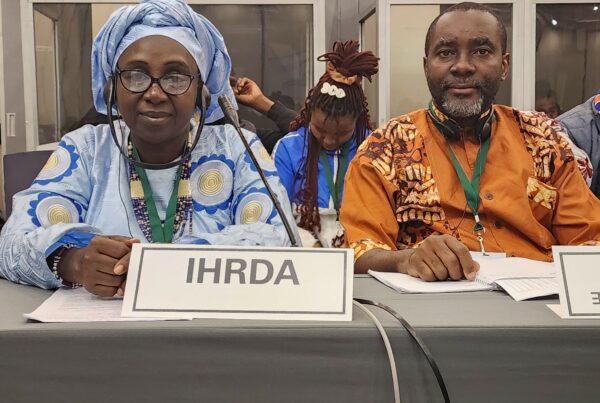Kenya has been found in violation of the rights of Nubian children to non-discrimination, nationality and protection against statelessness by the African Committee of Experts on the Rights and Welfare of the Child. In a landmark decision issued on 25 March 2011, the Committee finalised its consideration of case (called communication) 002/2009 which Nubian children in Kenya brought against Kenya.
This historical decision, the first one ever by the Committee, makes it the first time that a State has been found in violation of children’s rights treaty by an international body. The Committee is the only child rights treaty monitoring body with the power to determine cases.
Nubian children in Kenya had alleged violation of their rights, through systematic denial of Kenyan nationality. They had affirmed that this practice constituted discrimination, prohibited by Article 3 of the African Charter on the Rights and Welfare of the Child (the Charter) and a violation of their right to a nationality at birth as guaranteed by Article 6 (3). It also represented the State’s failure to fulfil its obligation to avoid the statelessness of children under Article 6 (4).
The Nubian children, through their counsel Institute for Human Rights and Development in Africa (IHRDA) and Open Society Justice Initiative (OSJI), furthermore asserted that the practice of denying nationality also contravenes Kenyan law. Kenya’s Children’s Act provides that “Every child has a right to a name and nationality. Where a child is deprived of his identity, the Government shall provide assistance and protection with a view to establishing his or her identity”.
Background
Most Kenyan children have a legitimate expectation that their Kenyan citizenship will be recognised at the age of 18, this is denied to Nubian children. Unlike other children in Kenya, they cannot be sure that they will be accepted as citizens, as they will be subjected to a long and complex vetting process to have their citizenship recognised. The Kenya National Commission on Human Rights has described this situation as “institutionalised discrimination” in its 2007 report An Identity Crisis? A Study on the Issuance of National Identity Cards.
The failure to recognise nationality also means that the government does not recognise Nubian property rights and treats them as squatters on their own land. Consequently, the government refuses to provide public utilities such as water to Kibera, which houses a large population of Nubians. Furthermore, it fails to provide equal access to education and healthcare, condemning Nubian children to a life of poverty. All housing in Kibera is, technically, “temporary”, and residents are not permitted to extend or even repair their houses.
A major difficulty in making the right to nationality effective for Nubian children is that many Nubian parents have difficulty in registering the birth of their children. Many public hospital officials refuse to issue birth certificates to Nubian children. The fact that many Nubian parents themselves lack valid identity documents as a result of the discriminatory practice of denial of ID cards further complicates their efforts.
Nubian children grow up knowing that they may not have equal access to employment, to the right to vote and work in the formal sector, and may not be able to travel abroad. ID cards are required for nearly all official transactions. Beyond securing employment in the formal sector and voting, the lack of an ID card bars individuals from opening a bank account or seeking a range of public services. It also restricts entrance into certain government offices, as well as access to any license, permit or other government document. The most serious problem caused by lack of national ID cards is police harassment: security agents often demand to be shown national IDs to forestall arrest.
The Committee
The African Committee of Experts on the Rights and Welfare of the Child monitors the implementation of the African Charter on the Rights and Welfare of the Child, which Kenya ratified on 25 July 2000, along with 44 other African countries. The Committee is currently the only child rights treaty-monitoring body in the world that receives complaints against State parties and is based in Addis Ababa. This communication, “002/2009 Nubian Children in Kenya v Kenya”, is the second received by the Committee and the first to reach the merits stage. The hearing and subsequent ruling were part of the Committee’s deliberations during its 17th Ordinary Session held in Addis Ababa from 21-25 March 2011.
Counsel for the Nubian children, IHRDA and OSJI had earlier presented their legal arguments at the first ever hearing on the merits of a Committee communication on March 22 2011.
The Committee will issue its detailed and reasoned decision in a month, where it will prescribe “recommendations it would make to the Republic of Kenya in respect of remedies it deems appropriate in order to promote, protect, respect and fulfil the best interests of Nubian children in Kenya”.





